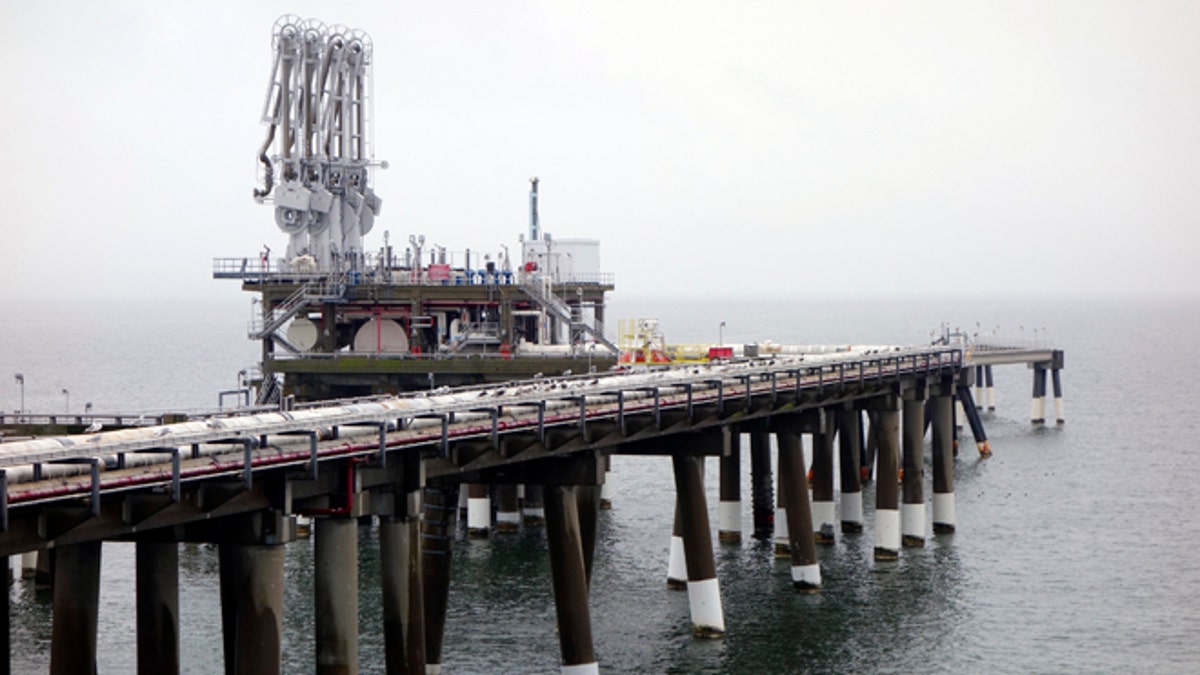
FILE: Feb. 5, 2014: The pier at Dominion's Cove Point liquefied natural gas plant on Maryland's Chesapeake Bay. (REUTERS)
The U.S. natural gas industry is backing Capitol Hill efforts to get the Energy Department to expedite gas sales overseas in a bid to undercut Russian influence, saying the U.S. government has dragged its feet.
Lawmakers have been pushing to speed up the export-approval process to help loosen Russia's energy grip over Ukraine and other countries, even if immediate changes might not do much to address the current crisis in Ukraine.
The Center for Liquefied Natural Gas -- which represents at least one company poised to start exportation -- acknowledged Wednesday that hastening the Energy Department's approval process is only a small piece of the puzzle toward making Ukraine and other countries less dependent on Russian gas.
However, the department for years has not followed its own rules and regulations on issuing permits, group President Bill Cooper said.
“Congress is trying to get the agency to do what it already should have done,” Copper said. “To say we’d be selling gas today, that’s not true. But the Energy Department needs to act. If it had, we wouldn’t be speculating about Ukraine today.”
Copper, a former House Energy and Commerce Committee lawyer, argues the industry isn’t asking the agency to change its policies -- only follow its existing rules and regulations on approving permits at the end of public-comment periods.
And beyond the issue of whether such changes would get natural gas supplies quickly overseas, Jamie McInerney, an energy expert at Washington, D.C.-based FTI Consulting, said hastening the approval process would undoubtedly send a “huge market signal” to Russian President Vladimir Putin that he has only temporary control over Europe’s natural gas supply.
He also said the debate alone about possible changes has already impacted energy markets and sparked overseas interest in import terminals.
The White House on Wednesday repeated what administration officials have said since Putin sent troops a few weeks ago into Ukraine’s Crimea region.
“We continue to take steps to assist the government of Ukraine with its energy security and energy efficiency,” White House Press Secretary Jay Carney said.
The bipartisan effort to speed export approval on Capitol Hill has included several proposed bills including a bipartisan Senate plan announced Tuesday.
“We need to work with Ukraine and the European Union to forge a long-term and short-term strategy that includes … an energy plan,” said North Dakota GOP Sen. John Hoeven, who is co-sponsoring the legislation with Virginia Democratic Sen. Mark Warner.
Debate on the bill and at least two similar ones in the GOP-led House will begin next week when Congress returns from break.
“It is going to take more than sanctions to stand up to Putin,” said Rep. Cory Gardner, R-Colo., who also has introduced an export-related bill.
The Energy Department has defended its approval process amid the recent calls for change, recently telling FoxNew.com that it “remains committed to an expeditious and responsible process.”
As the United States emerged in recent years as one of the world’s largest natural gas producers, only one American company is known to have all the federal permits for and to be close to liquefying and exporting natural gas --- Cheniere Energy Inc., at its Sabine Pass terminal on the Gulf Coast of Louisiana. The company did not return a request for comment Wednesday.
Close behind is Virginia-based Dominion, which hopes to start a similar operation in the near future at its Cove Point facility on Maryland's Chesapeake Bay.
Meanwhile, Warner and Hoeven say the Energy Department so far has approved just six projects while 20 applications remain pending, as Ukraine and the rest of Europe depend on Russia for about one-third of their natural gas needs.
Hill lawmakers and industry experts point out that Energy Department changes are only one part of the puzzle.
Among the other factors is that companies also need permits from the Federal Energy Regulatory Commission to build export facilities. And such projects cost $7 billion to $10 billion, money that must come from investors, likely including some still hurting from big losses in the natural gas import game that preceded the recent domestic boom.
Energy Department critics also argue the agency is slow in the export-approval process in large part because it was unprepared for the boom and is being pressured by a small-but-powerful coalition of U.S. manufactures that fears such changes will create a world market for natural gas that would end its ability to buy it cheaply.




